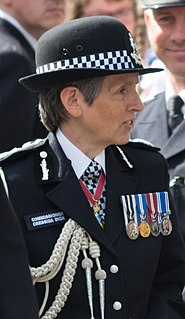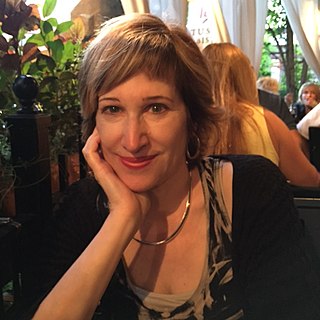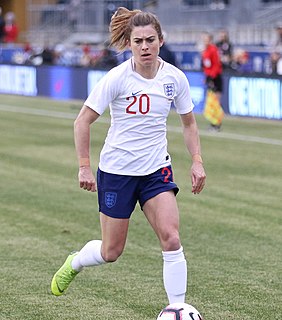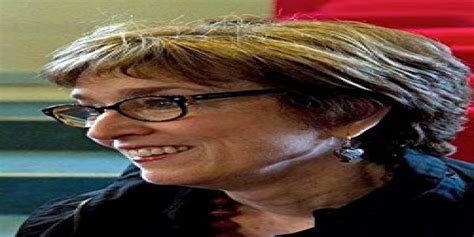A Quote by Cressida Dick
Some male colleagues, just as in accountancy, had doubts about whether women could perform some roles. There was a sense that women needed more protection or if men were out on the street they would be distracted by having to look after a female colleague.
Related Quotes
If you just look at the number of roles for women versus the number of roles for men in any given film, there are always far more roles for men. That's always been true. When I went to college, I went to Julliard. At that time - and I don't know if this is still true - they always selected fewer women than men for the program, because there were so few roles for women in plays. That was sort of acknowledgment for me of the fact that writers write more roles for men than they do for women.
We need more female directors, we also need men to step up and identify with female characters and stories about women. We don't want to create a ghetto where women have to do movies about women. To assume stories about women need to be told by a woman isn't necessarily true, just as stories about men don't need a male director.
Maybe just as many women writers as male writers could be billed as the next great American writer by their publisher. Maybe book criticism sections could review an equal amount of female and male writers. Maybe Oprah could start putting some books by women authors in her book club, since most of her audience is women.
Ideas about mothers have swung historically with the roles of women. When women were needed to work the fields or shops, experts claimed that children didn't need them much. Mothers, who might be too soft and sentimental, could even be bad for children's character development. But when men left home during the Industrial Revolution to work elsewhere, women were "needed" at home. The cult of domesticity and motherhood became a virtue that kept women in their place.
On the question of women's sexual freedom or female independence, there are still issues that haven't been worked out. There's an aura of traditional gender roles that is not talked about that really permeates these conversations. There is this vacillation between a desire for independence and having the kinds of sexual freedom that men have and, on the other side, issues about female vulnerability and susceptibility to male aggression and violence. We need more honesty about the actual conditions in which sex is happening.
From the beginning, God designed a world in which his image bearers - male and female together - were his A-Team for getting things done in the world. It was more than "wouldn't it be nice if men and women could get along better." God knew this was the way his world would work best and we would flourish as he intends. Men and women - together - in an alliance that received God's explicit blessing.
I nodded. A man's world. But what did it mean? That men whistled and stared and yelled things at you, and you had to take it, or you get raped or beat up? A man's world meant places men could go but not women. It meant they had more money,and didn't have kids, not the way women did, to look after every second. And it meant that women loved them more than they loved the women, that they could want something with all their hearts, and then not.
For a long time, way back in the ’30s and ’40s, there were fabulous female roles. Bette Davis and all those people had incredible, great roles. After World War II, something happened where it was not only "get out of the factories," but "get out of the movies." That's when women's roles started to really [change].
We had a moment in the '40s and '50s, where female characters were very strong in film, where these incredible roles were written for women like Joan Crawford, like Bette Davis. But then there was a space of time where - I don't know why - it wasn't like that. It became difficult for women to find certain roles after a certain age.
Women: I liked the colors of their clothing; the way they walked; the cruelty in some faces; now and then the almost pure beauty in another face, totally and enchantingly female. They had it over us: they planned much better and were better organized. While men were watching professional football or drinking beer or bowling, they, the women, were thinking about us, concentrating, studying, deciding - whether to accept us, discard us, exchange us, kill us or whether simply to leave us. In the end it hardly mattered; no matter what they did, we ended up lonely and insane.
I've been very lucky to have been chosen for and to have chosen roles that are good. Some are better than others and some projects are better than others, whether it's female or male characters. There's still more that we can do and there's still more stories to be told. I would love to see more female-driven projects in general.
I soon began to sense a fundamental perceptual difficulty among male scholars (and some female ones) for which 'sexism' is too facile a term. It is really an intellectual defect, which might be termed 'patrivincialism' or patrochialism': the assumption that women are a subgroup, that men's culture is the 'real' world, that patriarchy is equivalent to culture and culture to patriarchy, that the 'great' or 'liberalizing' periods of history have been the same for women as for men.
If you look at most women's writing, women writers will describe women differently from the way male writers describe women. The details that go into a woman writer's description of a female character are, perhaps, a little more judgmental. They're looking for certain things, because they know what women do to look a certain way.


































